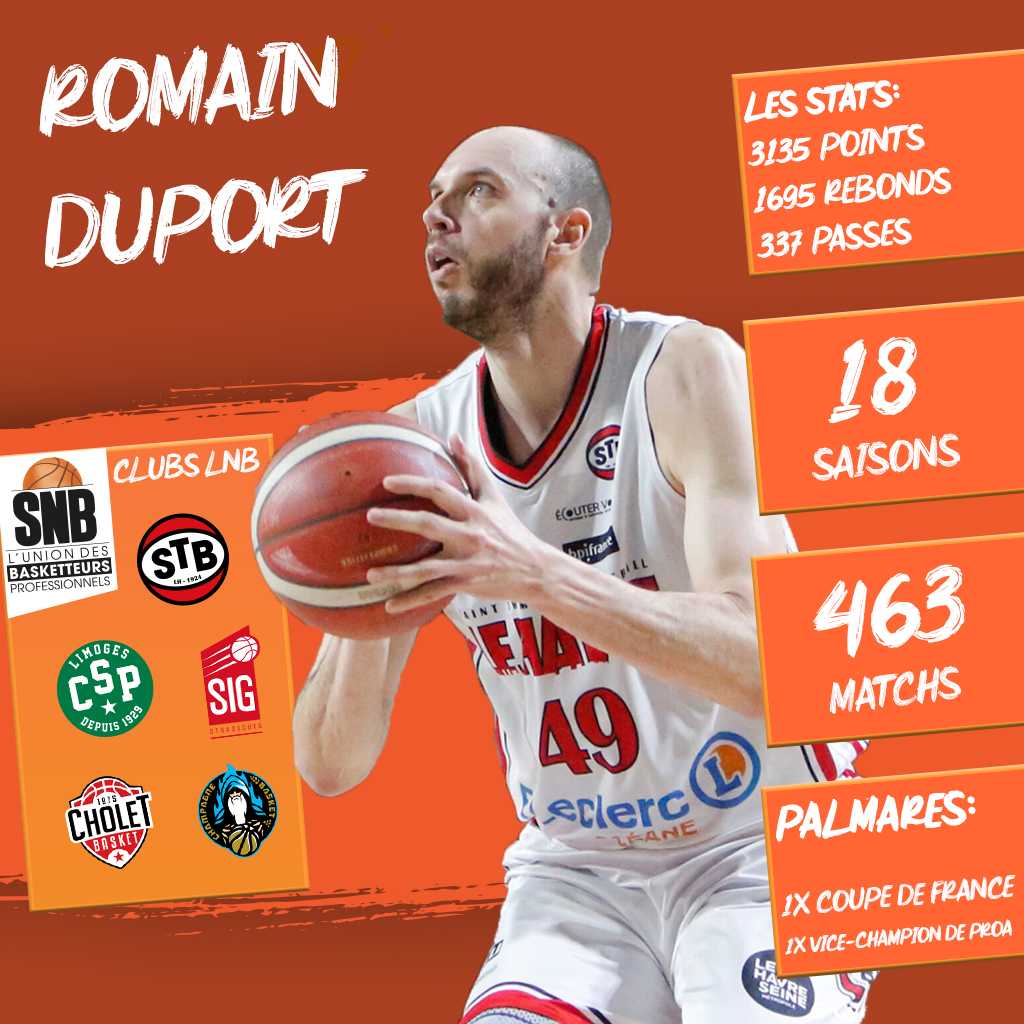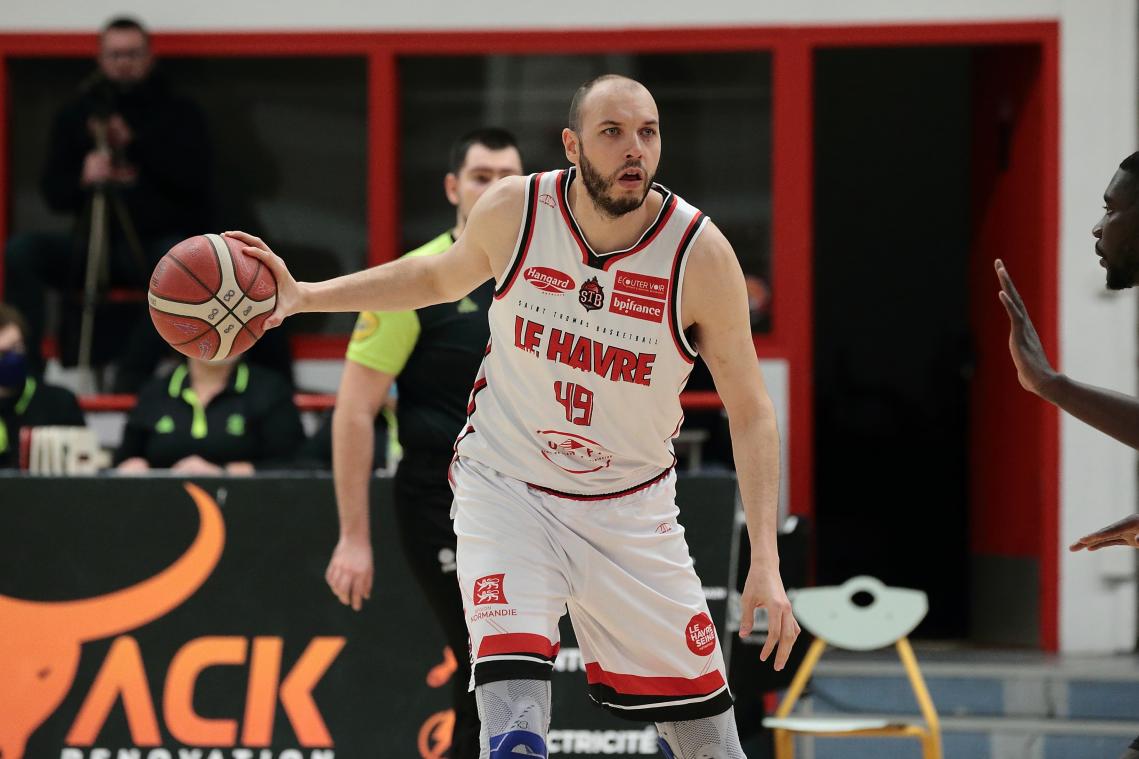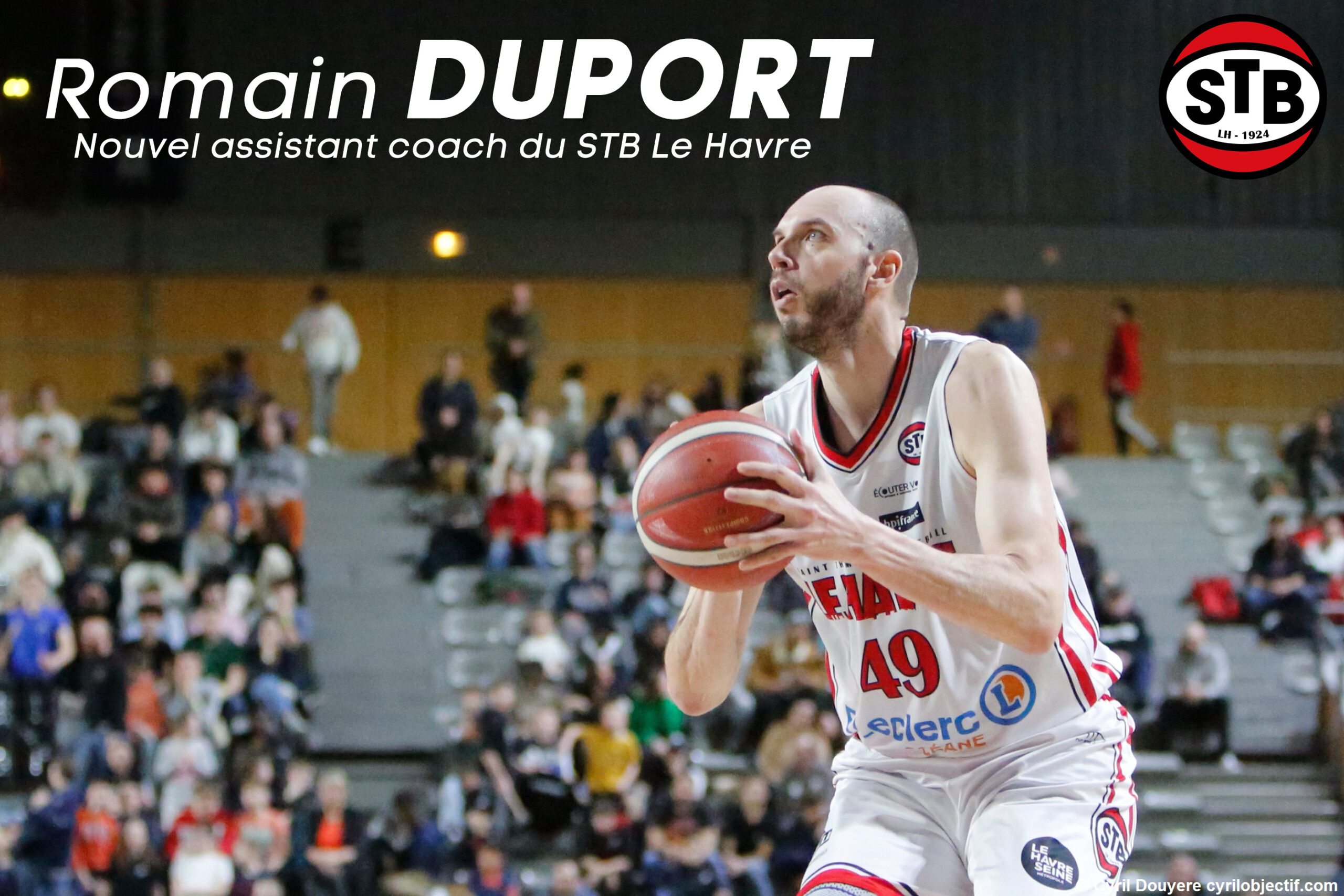One of our league’s “great” players is calling time on his career… Romain Duport.
Romain has spent 18 professional seasons, including 14 in the French elite, all the while playing for 5 different clubs.
Today, he talks to us about his career, his return to his training club, his future plans, and the importance of preparing mentally for a successful playing career.
Hi Romain,
It’s been another long season in NM1 for you!
This one is special because it’s officially the last of your career, so I wanted to know how you’re doing.
Hi Arthur! Quite long indeed!
Mentally, everything’s going well and I’m satisfied. I did everything I had to do, so I went as far as I could and even beyond.
I was just glad it was over, because physically, I really couldn’t do it anymore, I really couldn’t give it the way I used to.
It was getting too hard for me and I took the fact of stopping as a relief.
I also imagine that the physical side of things takes precedence over everything else at some point…
But I’ve been lucky enough to play until now, with all the injuries I’ve had in my career, and that’s something! I’m happy to be able to say it.
I was going to stop a season later, but I don’t think I’d have been able to play it, so it’s not a big deal if it’s a year off.
Besides, 18 is a hell of a career! You’ve been through practically everything.
Was finishing in NM1 at Le Havre a big deal for you?
I hadn’t necessarily planned to finish in NM1. But as you said, I’ve been lucky enough to experience practically everything at a high level, and I’m well aware of how lucky I’ve been.
It’s also the opportunities that make a career!
The year I’m going to Strasbourg, I didn’t have a club and I had the opportunity to sign as a freelancer and stay there. Then it all came together, with a succession of very good things.
The same goes for Le Havre. I wasn’t under contract and I had in the back of my mind the idea of maybe coming back there one day, to come full circle and finish where it all began.
In the end, I’m very happy to have come back to Le Havre. It was a setting that suited me perfectly and moving down two levels with Rudy, the president, who is a very good friend, made things even more pleasant.
Unfortunately, we weren’t able to bring the club back up the way we wanted, but I’m still very happy to have been able to play here in the end.
It was a great achievement!
That’s understandable! What was it like for you? Coming back after all these years, and what’s more, with a completely different status!
Yes, I came back with a completely different status to what I had at the time.
Those were my first years as a professional and I wasn’t quite up to speed yet. And even mentally, I don’t think I was ready to take the next step.
It’s only now, with the benefit of hindsight and years of experience, that I understand that I wasn’t at all ready to launch myself into the professional world. Even though I really wanted to, I wasn’t doing everything I needed to do to really get into it, and you see, coming back here after having experienced everything I’ve been through at the top level, I realize just how far I’ve come and the expectations there may have been of me.
And leaving aside this year, which has been really tough physically, I think I’ve lived up to expectations. Of course, you can always do more, but I never cheated and I gave it my all.
And do you remember what really triggered your decision to enter the professional world?
The real trigger was the summer when I switched from Le Havre to Cholet, the French champions.
That summer, I went on a training course in Los Angeles with a French physical trainer, and that’s when I really realized what I had to do to reach the top level.
He made me aware of a lot of things, and that’s when I started to work outside group training. Of course, I’d been doing it before, but now I’ve really turned a corner, both in terms of the way I work and mentally.
In any case, you quickly realize the difference in objectives and expectations of players when you change clubs, especially in this case when I was going to the reigning champion. So I very quickly realized that I had to improve my work ethic, and that was very beneficial, as it followed me for the rest of my career.
You mentioned the experience of playing for a defending champion, but what was your best experience as a professional player?
SIG is the best I’ve ever had, both in sporting and human terms. It was the best time I’ve ever had, both on and off the pitch, because we were just a bunch of buddies, both the French players and the foreign ones.
Everyone got on really well.
It’s really the one I’d rank at the top of my career!
Would you say that cohesion is an important condition for the success of a sporting project?
Yes, it’s very important! I’ve also known other years when it was French players on one side and foreign players on the other, and that always worked out much less well.
That said, there are always exceptions. These groups can succeed by giving their all during the play-offs, but it’s still quite rare.
And you see, even at SIG, where we had a great group, we lost in the final… so there’s no absolute truth.
But for me, this cohesion is hyper-important, because without it, you’re not ready to make the effort for others. This year, for example, maybe we lacked a bit of that cohesion to make it to the top.
As you look back over the last season, it’s a good opportunity to talk about one of the themes of our overtime column.
When did you start thinking about your post-career?
Well, you see, when I was at Limoges and I got injured and had to have knee surgery, I had started to think about it with the SNB.
I did a skills assessment from a distance, and that’s when I really started to think a little about my post-career future.
But you realize that it’s not easy to find something that will make you want to get up every day and go to work (laughs).
I’ve always come back to the same point: basketball is what has motivated me every day for 20 years, and I had no desire to leave it.
When I came back to Le Havre, the president told me about the opportunity to be an assistant on the NM1 team, and I accepted quite readily. To be honest, it might not have been what I thought I’d be doing straight out of my career, but as they say, life is made up of opportunities, and I thought it was the right time to seize this one.
So I’m going for it this year, and I already know it’s going to be a busy one because I’ve got a lot to learn, but I’m going to make the effort and give it my all!
And I’m starting this Monday, so I can’t wait to take part in this first event to get a first idea.
You don’t have time to take a breather after all! (Laughs)
So staying in basketball was an obvious choice for you?
Yes, I always knew I wanted to stay in the game. To tell you the truth, I even took another skills assessment last season, with the same result.
Even if today I’m not convinced that I have the ambition to become head coach one day, I’m happy to be moving towards an assistant position.
I was also very interested in becoming a sports director or GM, but maybe that’s something for the future.
I think that today, I really want to pass on to others everything I’ve been able to learn during my career, whether it’s to young players or to players already in the game.
I imagine that’s a role you’ve played in recent years, passing on to younger players, especially at Le Havre.
That’s for sure! After that, I’m not going to lie to you, I haven’t always been the best in terms of communication, or the best at passing on what I’ve learned to the teams I’ve played in. But I’ve always tried to be that way, to share what I’ve experienced year after year.
It wasn’t innate in me, but I tried to work on it as best I could at Le Havre. I realized that it wasn’t easy, but as I said, I’m aware that I still have a lot to learn and I’m very motivated to do it!
I don’t think there’s any point in lying to yourself, either as a man or as a player. We have weak points, and it’s up to us to be aware of them and work on them or not.
And was being assistant coach at Le Havre part of your plan when you returned to your training club?
It’s really since last season that the conversion project came up for discussion. It wasn’t really part of the original plan, but it came up quite naturally, and finally led to a job offer this season.
And how did those close to you react when you told them?
I didn’t tell them straight away, but waited until the project was certain before doing so.
But they obviously reacted very well. My parents were very happy for me, as were my family and friends who were still players!
All that only reinforced the fact that I’d made the right decision. I felt supported and I’m really happy about that.
By the way, do you find it easy to talk about career transition in the locker room?
I don’t think it’s taboo. It’s something I’ve already discussed with team-mates, even back when I was playing in the Pro A division.
Obviously, you talk about it more when there are older players in the dressing room who can talk about it, but even when you’re young, you wonder what the older players on the team are going to do. It’s funny to think that today I’m the one in that position (laughs).
But the wheel’s turning and now it’s up to us to think about what’s next.
I think that in any case, even if it’s only superficially addressed, it’s something we all think about at one time or another.
At the SNB, it’s an important subject that we discuss with young players, and we often find that it’s complicated to attract them to training and retraining.
In my opinion, it’s even the training centers that should be thinking about it.
A major injury, a cruciate ligament… you’re never prepared for that and your career is ruined.
Whether you’re young or old, the result is always the same, and I think that players need to prepare themselves as much as possible so that they’re not helpless when it happens.
And of course, players who have already been through it should share their experience to help them prepare.
I hope they hear you! (Laughs)
Finally, we were talking about young players. Do you have anything you’d like to pass on to them? Maybe some advice you’d have liked to have had at the start of your career?
If you’re going to be a professional, I think the most important thing is to have a routine, both on and off the pitch.
It could be before training, during shooting or even on the move, during recovery.
You mustn’t neglect anything, because as the years go by, you realize that everything is hyper-important, especially physical preparation.
When you come out of U23, you’re not necessarily ready for the pace of life as a professional, especially as the players who are already there don’t do you any favours (Laughs).
Make no mistake about it, all the young players who are succeeding today put in a colossal amount of work on the side.
What’s more, you have no excuse: every club has physical trainers, and that hasn’t always been the case!
I remember when I arrived at Le Havre, it was our physiotherapist who did our physical preparation! (Laughs)
And even if he knew what he was doing, it’s still different from someone whose job it is.
You also have to be mentally ready.
You can underperform, get injured or have a bad relationship with a staff member, but that’s no reason to give up.
I think the most important thing is to trust and listen to yourself, otherwise you’ll find yourself being overtaken by others.
At the start of my career, I put a lot of pressure on myself and I think that did me a disservice. I was the young guy who had everything to prove, and I didn’t need that extra burden.
Nowadays, you really have to armor yourself, especially young people, and I think the democratization of social networks clearly doesn’t help… Today, they can be insulted all day long by people who think they can do whatever they want behind a screen.
All this has nothing to do with the field, so don’t give it too much importance and concentrate on what you have to do to achieve your goal.
I think a good development for clubs would be to hire or work more with mental trainers/psychologists to be able to develop this part with the players and even the coaches, for whom it can’t always be easy.
I think this is a real area of work for structures wishing to go further in their professionalization.
We couldn’t agree more! Mental preparation is a real area of work for all those involved in sport, especially athletes.
You were telling me about social networks, and you’ve experienced their explosion. I’d like to know what you think.
Unfortunately, we know all about it. Receiving insulting messages or messages that put you down is part of our daily lives.
In times of trouble, some of them have hit me particularly hard, and I know we’re all the same in that respect.
Over the years I’ve stopped paying attention and I don’t even look at the comments and messages any more. And I’m convinced that, whatever people say, it’s not going to make you a good or bad player.
After that, I think it’s very important to talk about it, because it’s only going to get worse. When I see a youngster like Wembanyama who has to receive tons of negative comments every time he underperforms… when he should be in the limelight all the time!
And then there are all those who aren’t happy because they lost a bet too (Laughs).
All of which is to say that you have to be aware of it and, above all, be as prepared as possible for it all.
Thank you for your words, especially on this vitally important subject.
I’d also like to congratulate you on your fine career and wish you all the best in your future career as an assistant coach!
📸 STB Le Havre




